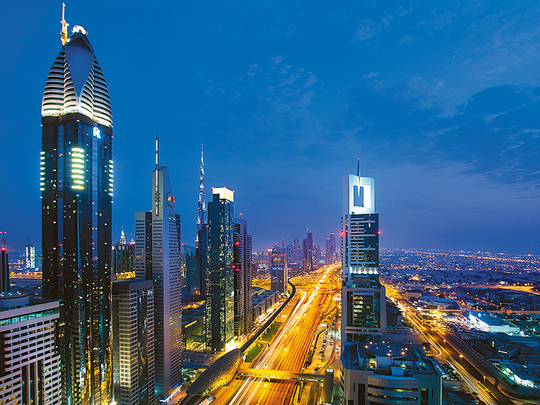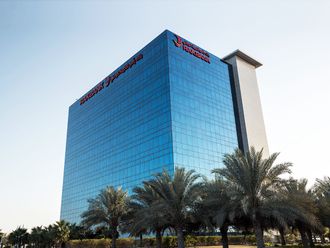
In the UAE, cash is still king. Almost Dh845 billion is processed in consumer payments to 170 government entities and more than 350,000 merchants every year, according to Triple, a UAE-based digital payment services company. Estimates suggest that about 75 per cent of all transactions in the country are carried out using notes and coins.
The country aims to change that, and fast. In just four years’ time, the UAE wants to be cashless. And it is not the only economy with similar ambitions. Norway, where just 5 per cent of transactions are made using cash, is set to become cashless by 2020. South Korea, where 20 per cent of transactions are carried out via cash, aims to achieve the same feat in four years.
In the UAE’s case, cashless does not mean eliminating coins and notes from the economy entirely. It simply means the penetration of cards and mobile devices for payments will be among the best-in-class globally.
And some think the country might actually be able to achieve it. “Clearly it’s ambitious in terms of a target but the UAE seems to specialise in pulling off the seemingly unachievable,” says John Sharman, CEO of Tuxedo, a global payment technology specialist.
A study by MasterCard in 2013 found the UAE had removed typical macroeconomic barriers to create a cashless society, driven largely by government mandates to shift salaries to electronic solutions. It said the implementation of the Wage Protection System — an electronic salary transfer system — meant millions of migrant workers in the UAE — most of whom do not have bank accounts — could be paid salaries via an integrated electronic set-up supervised by the Central Bank.
Dubai also implemented a solution for workers: the National Pay DubaiCard — a prepaid card that can be issued and activated instantly from various kiosks across the UAE. “We were approached to try and help National Pay, which is a company that has been formed to try and accelerate Dubai down the cashless path,” says Sharman.
The UAE’s cashless journey is also being supported by financial entities based inside the country. Mashreq is just one of the several banks that have embraced contactless payment technology. Its Tap n Go offering converts any mobile phone into a credit card. MasterCard rolled out its contactless payment service in the UAE in 2014.
“There is a significant move towards digital payment through various e-banking and mobile wallet initiatives being pursued by banks and [financial technology] entities,” says Ehsaan Ahmad, Head of Global Transaction Services and Corporate Strategy at Noor Bank. “The environment is conducive given the UAE smart government initiative and Dubai’s Smart City vision. The proportion of cashless transactions by 2020 is certainly expected to rise substantially.”
There are a number of reasons for that, says Aref Al Ramli, Regional Head of Digital Banking at Mashreq. The UAE is ranked seventh globally and first regionally for mobile payments, according to MasterCard Mobile Payments Readiness Index. It also has one of the highest smartphone penetration rates in the world, with 78 per cent of people living here having access to at least one, according to Nielsen.
“In addition, the country is also ranked first regionally and 23rd globally in the Networked Readiness Index issued by the World Economic Forum’s Global Information Technology Report 2015,” says Al Ramli.
This all means the percentage of cash transactions is set to plummet.
By 2020, cash will account for 50 per cent of transactions, says Philip King, Head of Retail Banking for the UAE at Abu Dhabi Islamic Bank.
“Moving to contactless payment is not an option — it’s inevitable, market dynamics is already aligning to move in this direction,” says Al Ramli. “The scale and volume of consumer payments are growing at such a fast pace that legacy modes will not be able to sustain and adapt to the new age needs.”
The UAE is also set to be one of the first countries to have a fully integrated mobile wallet platform supported by its entire banking sector, following an announcement by the UAE Banks Federation in 2014. The project is now pending approval from the UAE Central Bank and is part of the smart government initiative.
“Do I think it’s possible to give everybody the option to pay with something other than cash by 2020? I think it’s feasible. From a technical point of view, is it doable? Yes, it is,” says Sharman. The question then is will people’s behaviour change? “There are still people in more advanced payment markets than the UAE where they still like to use cash, so I suspect making the country cashless would be stretching it. But giving residents and tourists the ability to pay without cash by 2020? Yes, I think they can do that.”












